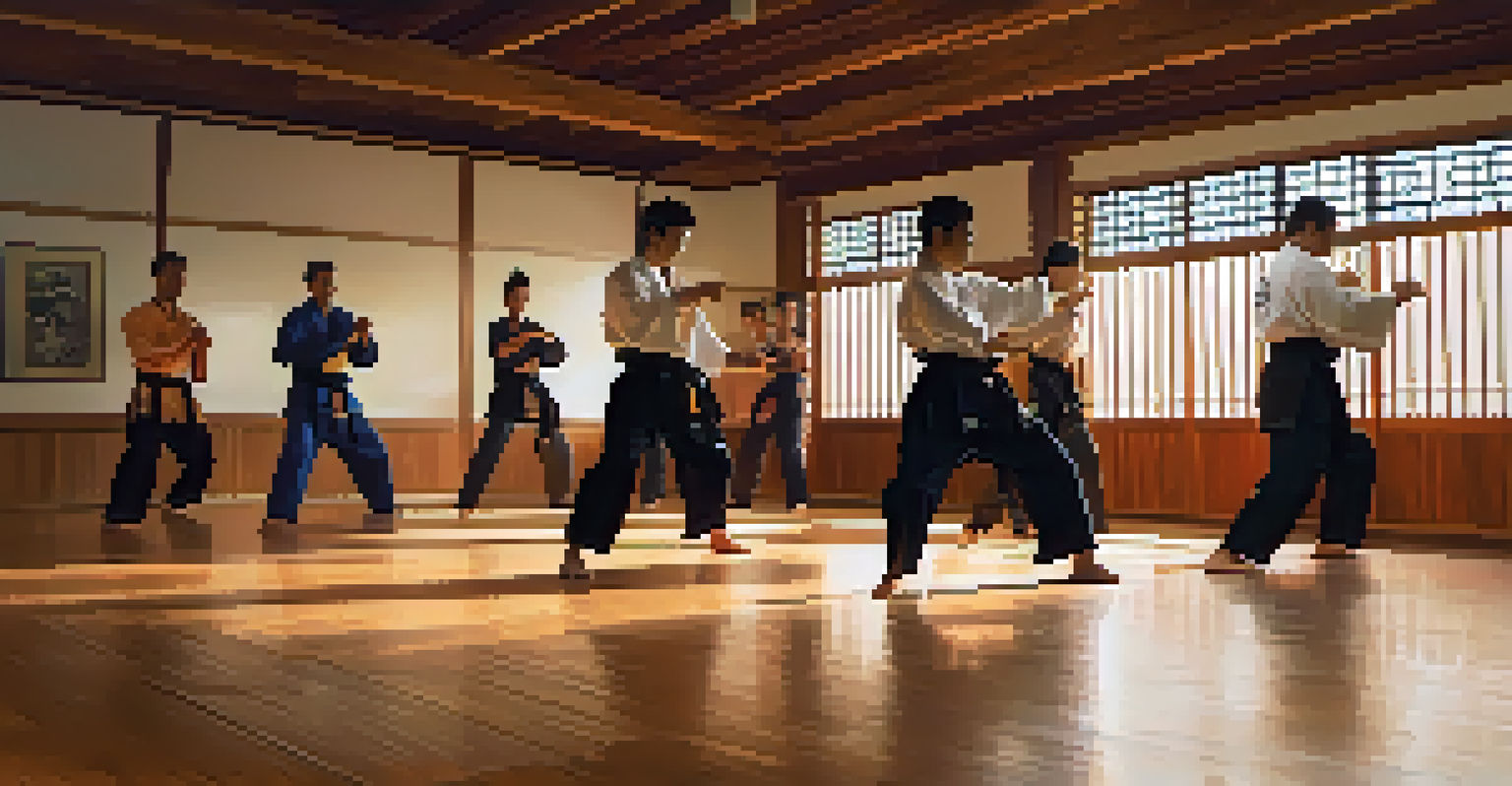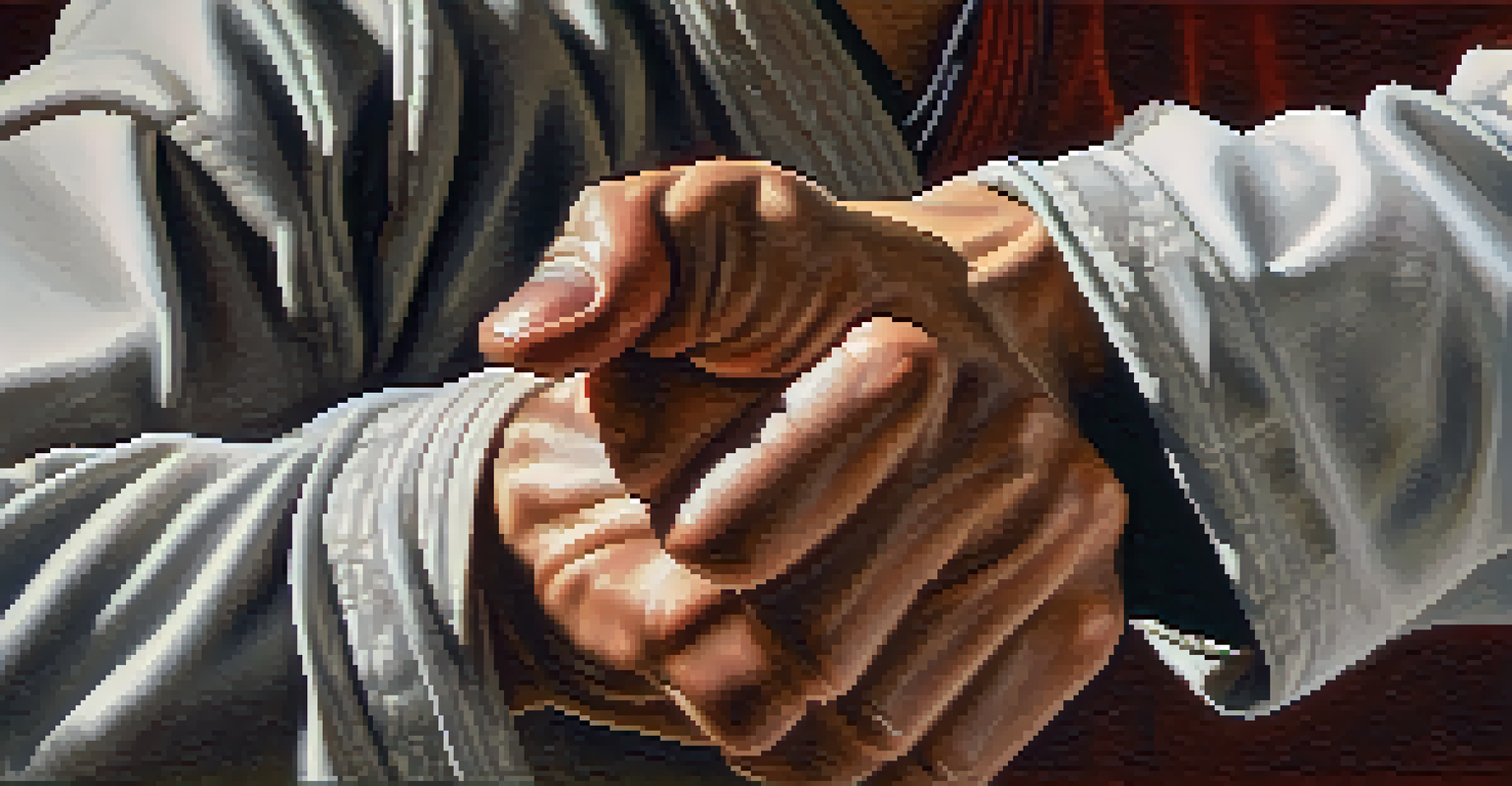Movement as Meditation: Martial Arts and Mental Clarity

The Connection Between Movement and Mental Clarity
Have you ever noticed how a brisk walk can clear your mind? Movement isn’t just about physical exertion; it’s also a powerful tool for mental clarity. When we engage in activities like martial arts, we tap into a rhythm that fosters focus and mindfulness.
Movement is a medicine for creating change in a person's physical, emotional, and mental states.
Martial arts require a unique blend of physical skill and mental concentration. Each movement demands attention, encouraging practitioners to stay present in the moment. This presence can help quiet the mind, making it a form of meditation in motion.
By immersing ourselves in the practice, we can shift our focus away from distractions and worries. Just like how a flowing river clears debris, martial arts can wash away mental clutter, leaving us with a sense of clarity and calm.
Martial Arts: More Than Just Physical Exercise
While many people view martial arts as a means to get fit, it offers so much more. It's an art form that integrates body and mind, creating a holistic approach to both physical and mental well-being. Each kick, punch, or stance is a step toward achieving inner peace.

The beauty of martial arts lies in its ability to teach discipline and focus. Practitioners learn to harness their energy and attention, transforming their training into a meditative practice. This disciplined approach can also spill over into everyday life, improving our ability to concentrate.
Movement Enhances Mental Clarity
Engaging in martial arts fosters focus and mindfulness, acting as a form of meditation that clears the mind.
Moreover, the repetitive nature of martial arts movements can be incredibly grounding. Just as a mantra in meditation helps center the mind, these movements can serve a similar purpose, creating a flow that calms and centers us.
Mindfulness Through Traditional Martial Practices
Many traditional martial arts, like Tai Chi and Aikido, emphasize mindfulness as a core principle. These practices encourage practitioners to be fully aware of their bodies and surroundings, which can enhance mental clarity. It’s about moving with intention, rather than rushing through motions.
The mind is everything. What you think you become.
Tai Chi, for instance, is often referred to as 'meditation in motion.' Its slow, deliberate movements allow individuals to connect deeply with their breath and body, fostering a tranquil state of mind. This connection can lead to a profound sense of peace and clarity.
Practicing mindfulness in martial arts not only sharpens focus during training but also translates to improved mental clarity in daily life. As we learn to be present on the mat, we cultivate the ability to remain centered amid life’s chaos.
Breath Control: A Key Element of Mental Clarity
Breath control is a fundamental aspect of both martial arts and meditation. In martial arts, proper breathing techniques are essential for executing movements effectively. But beyond that, they play a crucial role in calming the mind and enhancing focus.
When we breathe deeply and rhythmically, we activate our body's relaxation response. This response not only reduces stress but also improves our mental clarity. Each breath can serve as a reminder to stay grounded and focused, especially in high-pressure situations.
Mindfulness in Movement Practices
Traditional martial arts emphasize mindfulness, allowing practitioners to connect with their bodies and surroundings for improved mental clarity.
Incorporating breath control into your martial arts practice can create a seamless link between physical and mental exertion. Think of it as a bridge that connects your body’s movements with the clarity of your thoughts.
The Role of Visualization in Martial Arts Training
Visualization is a powerful mental tool used by martial artists to enhance performance and clarity. By mentally rehearsing movements, practitioners can create a clearer understanding of techniques. This not only boosts confidence but also sharpens focus.
Imagine a painter visualizing a masterpiece before their brush ever touches the canvas. Similarly, martial artists can visualize their movements and strategies, which allows them to prepare mentally for their practice or competition. This mental rehearsal can lead to improved execution and clarity during practice.
Through visualization, the mind becomes an active participant in the training process. This synergy between mind and body is what makes martial arts a unique form of meditation, allowing for deeper mental insights and clarity.
Community and Connection in Martial Arts
Martial arts often foster a sense of community that can enhance mental clarity. Training alongside others creates a supportive environment where individuals can share experiences and insights. This connection can provide motivation and encouragement, amplifying the benefits of the practice.
Being part of a martial arts community helps to reduce feelings of isolation, promoting mental well-being. The shared journey of learning and growth can lead to lasting friendships and a deeper understanding of oneself.
Community Supports Mental Well-Being
Being part of a martial arts community promotes connection and motivation, enhancing mental clarity and emotional release.
Moreover, the supportive atmosphere of a dojo or training space can make the practice feel more like a meditative retreat. As we connect with others, we also connect with ourselves, allowing for greater mental clarity and emotional release.
Embracing Movement as a Daily Practice
Integrating movement into your daily routine can significantly enhance mental clarity. Whether it’s practicing martial arts or simply engaging in physical activities, the key is consistency. The more we move, the more we can achieve that meditative state.
Consider starting small—perhaps a few minutes of shadowboxing or even a short yoga session. The goal is to find joy in the movement and make it a regular part of your day. Over time, you’ll notice a shift in your mental clarity and overall well-being.

Ultimately, embracing movement as a daily practice can transform your life. Just as a river carves its path through the landscape, regular movement shapes and clears the mind, leading to deeper insights and clarity.